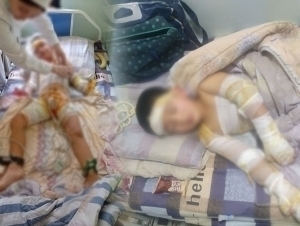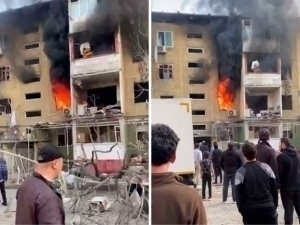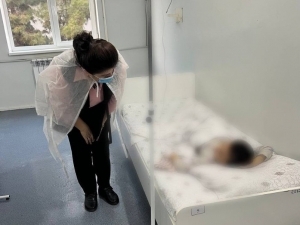Uzbek-Russian relations, energy hikes, and migrant dilemmas: weekly digest
Review
−
21 December 2024 12937 17 minutes
There is an old saying that a woman should not marry for forty years. Following this, I initially refrained from discussing the recent marriage of Minister of Economy and Finance Jamshid Kuchkarov. However, the Minister himself has become a trending topic across social media.
Last week, Kuchkarov presented the 2025 State Budget law to the Senate of the Oliy Majlis, where he announced yet another increase in gas and electricity tariffs starting April next year. This announcement has been met with widespread dismay, particularly among families already struggling to manage their heating and energy costs during the cold season. Many households refrain from turning on their gas stoves or heaters, not because they lack gas, but because they cannot afford it. In this program, we will delve deeper into the details of these tariff hikes.
The Growing List of Threatened Officials
There is a saying that resonates deeply: the butcher is in pain, and the sheep is in pain. In Uzbekistan, while ordinary citizens grapple with daily struggles such as paying for gas and ensuring their children’s welfare, high-ranking officials face their unique dangers. The list of threatened officials has now grown by one more name.
Dmitry Li, Director of the National Agency for Promising Projects, is the latest official to reportedly survive an assassination attempt. The incident has captured attention not just within Uzbekistan but internationally as well. Despite the seriousness of the situation, law enforcement agencies have remained notably silent, much like their response to the earlier assassination attempt on Komil Allamjonov.
Dmitry Romanovich Li has served as director of the Agency for Promising Projects since 2022. The attempt on his life dates back to August this year. Two individuals, Bislan Rasayev and Shamil Temirkhanov, are accused of orchestrating the plot. Both are Russian citizens and are currently wanted by Interpol at Uzbekistan’s request.
The two suspects face multiple charges, including failure to report a crime (Article 241), smuggling (Article 246), and illegal arms trafficking (Article 248) under Uzbekistan's Criminal Code.
Interestingly, Javlon Yunusov, who was implicated in the attempted assassination of Komil Allamjonov, was also on the Interpol list. Yunusov was apprehended in South Korea and later extradited to Uzbekistan. Additionally, another suspect, identified only as K.S., was found hiding in Kazakhstan. Investigators conducted operations involving his cooperation.
Reports indicate that Rasayev and Temirkhanov entered Uzbekistan through different routes. One suspect illegally crossed the Uzbek-Kyrgyz border, while the other passed through the "Dostlik" checkpoint. The two were allegedly hired by unknown clients, each promised $750,000, totaling $1.5 million, to assassinate both Komil Allamjonov and Dmitry Li.
Although two months have passed since the attempt on Allamjonov’s life, he has not made any public statements regarding the incident. The Prosecutor General’s Office has initiated criminal proceedings under Articles 25, 97 (Attempted Murder), and 248 (Illegal Handling of Firearms and Explosives) of the Criminal Code.
Several senior officials have been dismissed in connection with these incidents. This includes Lieutenant General Abdusalom Azizov, Chairman of the State Security Service; Colonel Akhrorjon Atkhamov, Head of the Criminal Investigation Service; and Colonel Doniyor Toshkhodjaev, First Deputy Head of the Tashkent City Police Department. Despite speculation, no official link has been drawn between these dismissals and the assassination attempts.
Unofficially, the dismissal of these figures is seen as connected to ongoing investigations. Law enforcement agencies may soon announce that Bislan Rasayev and Shamil Temirkhanov remain at large.
To date, investigations have identified seven individuals involved in the plot. Five of them are in custody, while two, including Rasayev and Temirkhanov, remain fugitives.
The hunt for these suspects spans across borders. Kazakhstan authorities have assisted in locating K.S., while South Korean officials facilitated Yunusov’s extradition to Uzbekistan. These collaborative efforts highlight the seriousness with which regional partners view these cases.
As Uzbekistan watches these developments unfold, questions persist about the safety of high-ranking officials and the broader implications for political stability. While ordinary citizens worry about rising energy prices, those in power face threats of a different magnitude.
The investigations continue, and the public awaits further announcements regarding the apprehension of the remaining suspects. In the meantime, the nation holds its breath, hoping for justice and security to prevail.
The Tragedy in Fergana: What Else is Being Kept Secret?
Fergana is in turmoil. Over the past week, residents have been gripped by fear following a devastating gas explosion and subsequent fire. On December 17, a large gas leak at the Petroleum and AQS station on Ahmad Yassavi Street in the Yangi Yul neighborhood of Fergana City led to an explosion and blaze, resulting in multiple fatalities. Official sources cite the death toll at four, but social media is rife with skepticism, with claims suggesting the actual number could exceed ten or even twenty. The dramatic videos circulating online depict a catastrophe of far greater magnitude than officially acknowledged.
According to the regional Emergency Situations Department, the explosion and fire were triggered by violations of technological processes and non-compliance with safety regulations during the handling of liquefied gas.
Videos recorded from nearby residential buildings show a thick fog of leaking gas moments before a sudden flash ignites the area, engulfing people in flames. The explosion caused extensive damage to surrounding buildings and vehicles, with twelve individuals sustaining injuries or burns.
Despite the scale of the incident, no government commission has been publicly formed to investigate the matter. However, a criminal case has been launched under Article 257 (Violation of Labor Protection Rules) Part 3, Paragraph “a”, and Article 259 (Violation of Fire Safety Rules) Part 3, Paragraph “a” of the Criminal Code. Five individuals have been taken into custody in connection with the case. Investigations and expert evaluations are ongoing.
In the aftermath of the tragedy, the regional governor ordered a comprehensive inspection of all gas stations in the Fergana region to assess their compliance with safety regulations and technical standards.
Urban planning guidelines, specifically the “Urban Planning Norms and Rules – Gas Stations” published by the State Committee for Architecture and Construction of Uzbekistan in 2008, clearly outline the minimum required distances between gas stations and residential or public buildings. These stipulate that gas stations or underground liquefied gas storage facilities must be located at least 100 meters from residential areas, while above-ground storage facilities should be no closer than 300 meters.
This raises pressing questions: Where were the responsible authorities before this disaster? Who authorized the construction of a gas station within proximity to residential areas and kindergartens, in blatant violation of urban planning standards? Why are inspections being prioritized only after fatalities occur?
Tragically, this incident reflects a broader pattern of reactive governance. It appears that action is only taken after lives are lost, families are torn apart, and children are left orphaned or disabled.
Speculation is growing about potential political connections that might have shielded the station from scrutiny. Reports indicate that the gas station may be linked to Azizkhodzha Yusupkhodzhaevich Mavlonov, a relative of Akmalkhodzha Mavlonov, the chairman of the Kyrgyz Customs Committee. Notably, neither the Customs Committee, regional authorities, nor Akmalkhodzha Mavlonov have denied these claims.
The Fergana explosion serves as a stark reminder of the dangerous consequences of negligence, corruption, and the failure to enforce safety regulations. As investigations proceed, the public remains watchful, demanding accountability and meaningful reforms to prevent further tragedies.
Electricity and Natural Gas Tariffs to Increase Again in Uzbekistan
As the cold winter months approach, the rising costs of gas and electricity in Uzbekistan are becoming an increasingly pressing concern for the population. The limits imposed on gas and electricity consumption this year, coupled with price hikes, have left many citizens grappling with difficult choices. Use gas freely, and the cost burdens households; limit usage, and families endure freezing homes, risking illness and expensive medical bills. Pharmacies, already costly, see price surges during flu seasons, adding another layer of hardship for ordinary citizens.
Deputy Prime Minister and Minister of Economy and Finance Jamshid Kuchkarov announced that electricity and natural gas tariffs will increase again from April 1, 2025. This statement was made during a plenary session of the Senate of the Oliy Majlis.
“If tariffs increased this year, the Cabinet of Ministers has already approved proposals to raise tariffs again from April 1 next year. If circumstances allow, the tariffs will be adjusted accordingly,” Kuchkarov said.
The minister elaborated that despite the tariff hikes, the government continues to provide substantial subsidies to the energy sector. The tariffs still do not fully cover production costs, especially since part of the country’s gas supply is imported.
“In the draft budget for next year, subsidies for gas and electricity are projected at seven and a half trillion soums. This figure has decreased from twelve trillion soums allocated this year. If you ask, 'When will these subsidies end?' they will continue through 2025-2026 but decrease sharply by 2027. From 2028, if feasible, subsidies will no longer be provided from the budget,” Kuchkarov explained.
Adding to public frustration, Kuchkarov revealed that heat supply tariffs in Tashkent will double next year. However, he acknowledged that even this significant increase may not suffice to address the underlying issues in the heating sector.
“Heat supply enterprises face more complex challenges. Tariffs vary significantly by region — production costs in Tashkent differ from those in Bukhara or Fergana. Additionally, the infrastructure is outdated. Boiler rooms and supply networks still operate on Soviet-era technology, consuming excessive gas and yielding inefficient results. The lack of meters to measure heat consumption exacerbates the problem,” Kuchkarov noted.
Despite public concern, the Senate unanimously approved the draft law "On the State Budget for 2025."
The document projects an inflation rate of around 7% in 2025, reflecting prevailing economic conditions. State budget revenues are anticipated to reach 308.5 trillion soums, while expenditures will amount to 344.8 trillion soums. The revenues and expenditures of state trust funds (excluding inter-budgetary transfers) are estimated at 66.4 trillion soums and 62.8 trillion soums, respectively.
The looming tariff increases reflect ongoing economic adjustments as the government attempts to balance the budget while maintaining essential services. However, for many Uzbek families, these rising costs signify further financial strain during already challenging times.
The Taliban to Be Removed from Russia's List of Banned Organizations
In a significant shift, the Russian State Duma has passed a law in its second and third readings that paves the way for removing the Taliban movement from Russia's list of banned organizations. The Taliban, which currently governs Afghanistan, has been classified as a terrorist organization in Russia since 2003. However, despite this designation, Moscow has maintained ongoing communication with the group in recent years.
The newly adopted legislation allows for amendments to the federal list of terrorist organizations immediately after a relevant court decision takes effect. The bill was developed by five deputies and seven senators. Ernest Valeev, deputy chairman of the State Duma Committee on Security, noted that once the Taliban is delisted, Russian citizens could potentially join the movement legally.
Russian President Vladimir Putin has previously referred to the Taliban as "partners," while Foreign Minister Sergei Lavrov has described them as "wise people." The law's passage signals a shift in Russia’s diplomatic stance towards Afghanistan and its leadership under the Taliban.
Uzbek Accused in Russian General's Assassination
An Uzbek national has been implicated in the assassination of Lieutenant General Igor Kirillov, a key figure in Russia’s Radiation, Chemical, and Biological Defense Forces. Kirillov and his assistant were killed in Moscow on December 17 by an explosive device rigged to an electric scooter outside their residence.
Kirillov had been a vocal critic of the United States, frequently accusing Washington of war crimes. Following his death, the Russian Investigative Committee opened a criminal case. Though Kyiv has not officially commented, Ukrainian security sources have claimed responsibility for the attack, labeling it a “special operation.”
One day before Kirillov’s assassination, Ukraine’s security service declared him a suspect in a criminal case involving the alleged use of chemical weapons in eastern and southern Ukraine.
In a surprising twist, Russian authorities have detained 29-year-old Akhmad Kurbanov, an Uzbek national, in connection with the assassination. According to Russian investigators, Kurbanov was recruited by Ukrainian intelligence services and promised $100,000 and relocation to Europe in exchange for executing the attack. He allegedly planted the explosive device and monitored the general’s residence with surveillance equipment transmitting data to Ukraine.
A video released by the Russian Federal Security Service (FSB) shows Kurbanov confessing to his role in the assassination. The suspect claims he activated the explosive when Kirillov exited his home.
The arrest of an Uzbek citizen has raised concerns among the Uzbek diaspora in Russia, echoing earlier instances where Tajik migrants faced heightened scrutiny after the Crocus City Hall terrorist attack. Uzbek social media users fear potential backlash, highlighting the fragile position of Central Asian migrant workers in Russia.
Following Kurbanov’s arrest, Uzbek President Shavkat Mirziyoyev expressed his condolences to President Vladimir Putin and condemned the terrorist act during a phone call on December 19. Mirziyoyev reaffirmed Uzbekistan’s commitment to cooperating with Russian authorities in combating terrorism.
Kurbanov remains in custody until February 17, 2025, pending further investigation.
Russia May Ban Admission of Migrant Children Who Do Not Know Russian to Schools
The demands placed on migrants in Russia, regardless of their country or nationality, are increasing day by day. Of course, even Uzbeks who go to work in the cold Russian lands in search of a living cannot escape this. The next demand is about the Russian language, which is Russia's soft power, but is protected by hard means.
On December 20, the Federation Council of the Russian Federation approved a law prohibiting the admission of children of migrants who do not know Russian to schools.
Now, a language proficiency test will be introduced for migrant children. Those who fail it will not be admitted to schools.
The Federal Service for Supervision of Education and Science (Rosobrnadzor) should develop materials for the test, and determine the assessment criteria and the minimum score.
In addition, students who live in Russia illegally and do not have documents will not be admitted to the school. If the law is signed by the President, it will come into force on April 1, 2025.
According to Alisher Kadyrov, a deputy of the Legislative Chamber of the Oliy Majlis of Uzbekistan, and head of the "Milliy Tiklanish" Democratic Party faction, Russian lawmakers have chosen the easy way out of the country, not to teach Russian to children of migrants, but to expel those who do not know the language.
“Our Russian colleagues have chosen the easy way out of Russia, not to teach Russian, but to expel those who do not know it from Russia and children from school. This law can sharply reduce both the need for and respect for the Russian language in post-Soviet countries,” he wrote.
At the same time, Kadyrov reminded that in Uzbekistan thousands of compatriots work in government agencies and hundreds of thousands of students in schools who do not know the state language at all, as well as their children.
Russian President Vladimir Putin believes that it is necessary to further tighten the requirements for migrants from Central Asia. He spoke about this on December 19 in the program “Results of the Year with Vladimir Putin”.
According to Putin, the population of Central Asia should be trained to work in Russia. Russian schools should be opened there, and culture and language should be taught.
The president called the migration problem “very delicate and acute.” He stressed that Russia lacks workers. There are already hundreds of thousands of vacancies. To reduce the number of migrants, it is necessary to increase labor productivity and focus on high-tech industries.
At the same time, the death of Kirillov and the issue of how to treat migrants, especially Uzbek labor migrants, from now on remain the main topics in the corridors of the government and parliament. Not all members of the Russian parliament have a unanimous decision on expanding the requirements and barriers against migrants. The State Duma Committee on CIS Affairs is urging Russians to refrain from migrantophobia. According to the chairman of the committee, Leonid Kalashnikov, it is wrong to blame Uzbeks for everything.
“You should not blame Uzbeks for everything. If a Russian has done something somewhere, does this mean that everything is bad in our country? Of course not, this is a very primitive view. It is useless to link relations between states to just one Uzbek. Our task is to ensure that all migrants who come here to work are not left wandering on the streets and are not left unattended,” says Kalashnikov.
According to Konstantin Zatulin, First Deputy Chairman of the Committee on CIS Affairs, the terrorist attack in Crocus and the death of General Kirillov show that Ukraine is deliberately using citizens of the CIS countries from Central Asia as criminals.
“The secondary goal of the terrorist attack is to incite a wave of anti-migrant sentiment and a conflict between Russia and Uzbekistan, Tajikistan, and others. Trying to blame Uzbekistan and its relations with it for the terrorist attack is, in essence, accusing the Republic of Uzbekistan of complicity in the crime committed. Does anyone suspect President Mirziyoyev of aiding the murderers of General Kirillov? There is no such evidence. But there is absolutely clear evidence that those who call for revenge against Uzbeks or Tajiks are, knowingly or unknowingly, carrying out someone else's order,” the deputy said.
In Samarkand, a bride threw herself out of the window of a multi-story building
Recently, we have been hearing a lot about unpleasant cases of suicide among women. The latest one happened in Fergana. A student of the Kokand State Pedagogical Institute committed suicide by jumping from the 3rd floor of the institute's student dormitory.
It is reported that a 2nd-year student of the Faculty of Applied Sciences of the Kokand State Pedagogical Institute, born in 2005, committed suicide by jumping from the 3rd floor of the institute's student dormitory No. 3 at 1:20 a.m. on December 13 of this year. As a result, she received injuries and was taken to the Kokand city central hospital.
Currently, the city prosecutor's office is conducting a pre-investigation investigation into this case.
As you know, the girl survived in the Kokand case, but the incident in Samarkand ended in tragedy. Recently, many people have been contacting me on my social media page asking me to help them find out the cause of the death of a bride from Samarkand.
The story is about a 23-year-old bride in Samarkand who committed suicide by jumping out of the window of an apartment building. We do not have information about her suicide, but the Prosecutor General's Office is saying this. According to rumors, she did not commit suicide but was forced to jump out of the window. Meanwhile, rumors and photos have been circulating on social media that she was a victim of constant domestic violence.
The Prosecutor General's Office announced that a forensic medical examination had been ordered for the woman's death. Currently, the Samarkand city prosecutor's office is conducting a pre-investigation investigation into this case, and it has been announced that a legal decision will be made based on the results.
Now men can also take a 5-day leave when they have children
At the end of the program, I have some good news to make you happy. Now, in Uzbekistan, men can take a short-term, 5-day leave when they have children to help their spouse or take care of other children. This initiative aims to promote family well-being and encourage fathers to take a more active role in early childcare.
This is still just a draft, but if passed, it will be a significant step toward supporting working families and promoting gender equality in parental responsibilities.
Live
All



